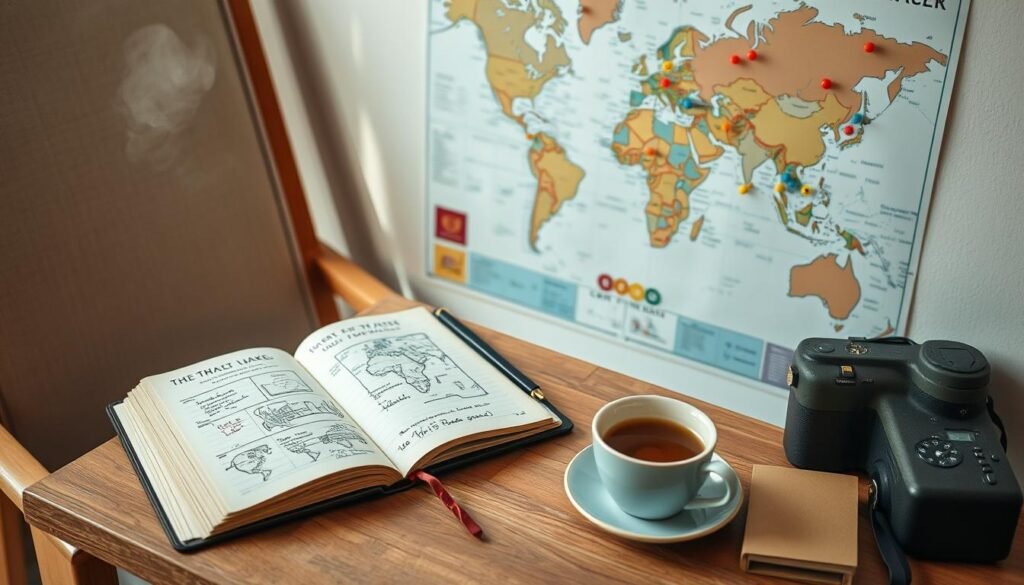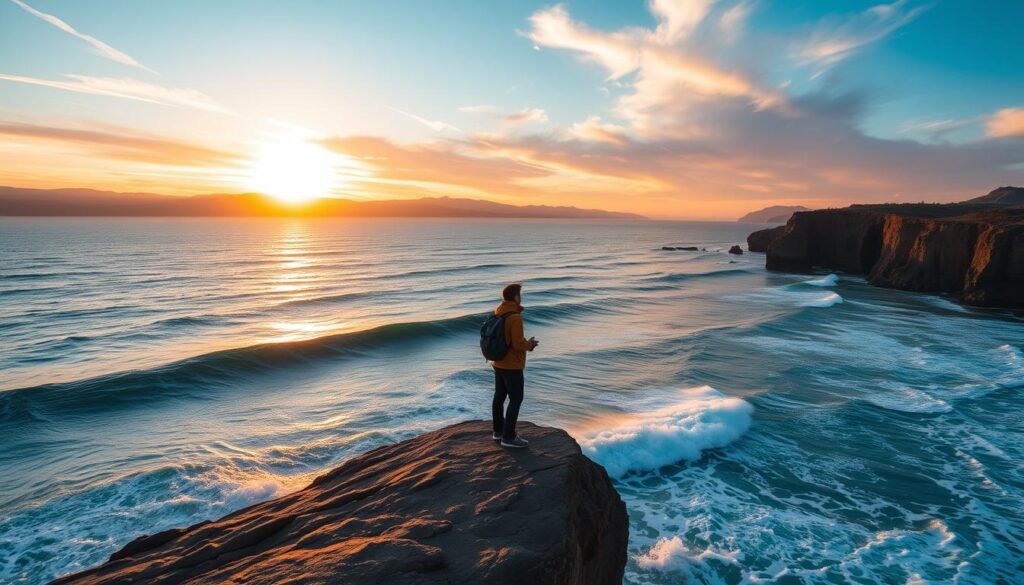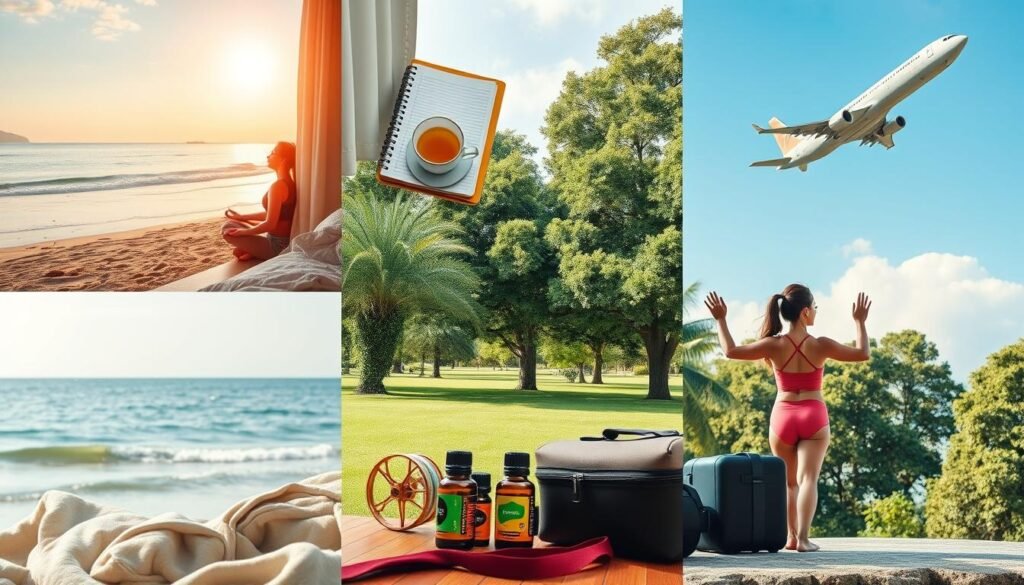About 25% of travelers get anxious when flying. This big number shows many people worry, especially when summer trips start. Travel anxiety comes from not knowing places, trying new foods, and meeting different people. Getting ready mentally for travel helps turn anxiety into a positive mindset. With good strategies, travelers can get stronger mentally. This strength helps them enjoy new experiences confidently.
First, understand what travel anxiety is. Some may have panic attacks or feel very anxious. But, doing deep breathing or meditation can really help lessen these feelings. Getting support from groups or friends who’ve traveled a lot is also great. If these steps don’t help enough, it might be time to see a professional. They can help prepare you emotionally for your travels.
Key Takeaways
- Travel anxiety affects approximately 25% of travelers, particularly in flying situations.
- Recognizing and addressing personal triggers can enhance mental preparation for journeys.
- Effective relaxation techniques like meditation and deep breathing can alleviate anxiety.
- Joining support groups can provide vital emotional backing for anxious travelers.
- For severe anxiety, consulting mental health professionals may be necessary.
- Physical activity, such as exercise, is proven to reduce anxiety levels before travel.
- Flight attendants’ support plays a crucial role in easing passengers’ anxiety.
The Nature of Travel Anxiety
Travel anxiety is the fear people feel about going to new places. It shows up as unease, physical discomfort, and worry about what could go wrong. These feelings can be strong and affect us in many ways.
Many things cause this fear. A big one is the fear of flying or aviophobia, affecting many. The unknown parts of traveling can make us scared. This includes worrying about plans, meeting new people, and leaving home. For parents, the worry about their kids’ safety can make this anxiety even stronger.
Managing travel anxiety starts with understanding it. Making plans and keeping your space tidy before you go can help. So does packing early to avoid last-minute stress. Keeping a list of what to bring makes sure you don’t forget anything important.
Thinking ahead about what might go wrong and having a plan can also help. Having friends or family to talk to during your trip can make you feel better. Practices like mindfulness and deep breathing can get you ready mentally. They help you focus on the now, not on your worries.
To really enjoy traveling, understanding and preparing for travel anxiety is key. If you’re looking for ways to cope, there are resources that can help. They offer advice tailored to your needs and help you identify what triggers your anxiety. Click here for a useful resource.
Understanding the Symptoms of Travel Anxiety
Many people experience travel anxiety, showing signs of stress both mentally and bodily. Signs in your thoughts include worries about what might go wrong, feeling easily annoyed, and finding it hard to focus. These issues can make travel seem too daunting, spoiling the fun and sometimes causing panic attacks.
On the bodily side, you might notice your heart racing, sweating, an upset stomach, and headaches that won’t go away. Trouble sleeping is another common sign, making people worry if they’re really ready to travel. This doubt often makes travelers anxious about handling travel challenges.
It’s important for travelers to spot these signs early. Knowing what you’re dealing with helps you prepare mentally. Understanding how to manage these feelings can make traveling much better. Overcoming worries about being judged by others can boost your confidence, leading to smoother trips.
| Symptom Type | Psychological Symptoms | Physical Symptoms |
|---|---|---|
| Common Symptoms |
|
|
Common Triggers of Travel Anxiety
Travel anxiety can show up differently for everyone. Some common triggers are the fear of flying, bad past travels, and worries about leaving loved ones. These Travel Anxiety Triggers can lead to physical symptoms like shaking, not being able to breathe easily, and feeling dizzy.
Knowing what triggers your anxiety helps when you’re in new places. You might feel more anxious in social situations or if you don’t speak the language. Travel delays can also make anxiety worse. Being flexible and having a plan can help calm your nerves.
Before you go, making checklists and knowing who to call in an emergency can be really helpful. These steps keep you organized and can make you feel supported. Talking to friends when things don’t go as planned can also make you less worried. The most important thing is to understand what makes you anxious and how to deal with it.
| Travel Anxiety Triggers | Symptoms | Management Strategies |
|---|---|---|
| Fear of Flying | Shortness of breath, sweating | Deep breathing exercises |
| Unexpected Delays | Panic attacks, irritability | Flexible itinerary planning |
| Social Anxiety | Difficulty focusing, quick anger | Practice social interactions |
| Leaving Loved Ones | Feeling panicky, mood changes | Regular check-ins via message or call |
Preparing Mentally for Travel
Getting ready for a trip is more than packing and booking tickets. It means getting your mind ready too. You need to know what stresses you out and how to deal with it. It’s important to understand your fears, like flying, where you’ll stay, or missing home.
Identifying Personal Triggers
Finding out what makes you stressed helps you face fears. It’s good to think deeply about your feelings. You can write in a journal or talk to a friend who listens well. About 70% of people feel some stress about traveling. Knowing this helps you prepare better mentally. It helps to talk to others who know what it’s like. You can get great tips from those who have been through it. For tips on getting ready emotionally, check out this guide.
Planning Ahead for a Smoother Experience
Planning well makes things less uncertain and less stressful. Having a clear plan, knowing about your destination, and making sure you have all documents ready is key. Not doing your homework can make 40% of travelers feel more anxious. But being flexible with your plans helps you relax and enjoy new things. Around 81% of travelers who are open to new things feel happier during their trips. And remember, it’s crucial to take time for yourself. Over 90% of travelers say it helps them feel better.

| Preparation Strategy | Benefits |
|---|---|
| Identifying Triggers | Reduces anxiety by addressing specific concerns |
| Thorough Research | Minimizes uncertainties and enhances confidence |
| Detailed Itinerary | Provides structure and promotes excitement |
| Open-Mindedness | Increases satisfaction and enjoyment |
| Flexible Plans | Encourages adaptation and lessens stress |
Making an effort to prepare mentally for travel really makes your trip better. It leads to emotional readiness and more fun on your journey.
Effective Relaxation Techniques for Travelers
Travelers often feel anxious before they start their journeys. Using good relaxation methods is key to handling these feelings. This makes the trip more fun. Mindfulness for Travelers teaches staying in the moment. It helps with the stress that comes before trips.
Mindfulness Practices
Mindfulness, like meditation and grounding, helps a lot with travel stress. Spending a few minutes each day on the now helps calm your mind. It makes anxiety lower.
Body scans are also great. They help you notice how your body feels and find stress points. This makes you relax more.
Breathing Exercises
Breathing exercises are easy but very effective. Deep breaths can calm you down quickly. Let’s look at some methods:
- 4-7-8 Breathing: Inhale for 4 seconds, hold for 7, and exhale for 8.
- Box Breathing: Inhale for 4 seconds, hold for 4, exhale for 4, and hold again for 4.
- Diaphragmatic Breathing: Breathe deeply into your belly, not just your chest.
Using these methods before and during trips can help you feel more in control. This improves your travel experience.
The Role of Emotional Readiness in Travel
Emotional readiness greatly shapes how travelers experience their journeys. It helps them beat travel anxiety. By building emotional readiness, you gear up with the right mindset. You get ready to handle different situations that travel throws at you. Getting this concept makes traveling new places less daunting and more fun.
To get mentally tough, try mental resilience for travelers. This includes writing in a journal, practicing mindfulness, and reading guides that help you grow. These habits boost your emotional stability. They let you reflect on your thoughts and feelings. Using positive affirmations can make you believe in yourself more. This helps you take on any travel challenges head-on.
Learn about where you’re going to increase your emotional readiness. Know the culture, laws, and health care there. This prep makes the unknown less scary and boosts your confidence. Keeping things organized matters too. Balancing work and fun reduces stress. This makes traveling more fun.
Building a network through social media and travel groups helps you feel less alone. It lets you share what you learn and feel with others. Having real expectations means you know trips aren’t perfect. This helps you enjoy the unexpected parts of your journey. With the right mindset and tools, travel becomes an awesome chance for personal growth and finding yourself.

Self-Care Strategies Before Your Trip
Travel adventures often bring challenges. Prioritizing self-care makes travel better and helps with stress. Taking time to care for your physical and emotional health creates a balanced mindset before a trip.
Importance of Physical Activity
Regular physical activity is key to lowering anxiety before trips. Jogging, yoga, or walks can release endorphins, boosting your mood. A routine that includes exercise improves your physical and emotional health, making travel stress easier to manage.
Scheduling Downtime
Adding downtime to your pre-travel plan is essential. It allows you to rest and recharge. Take time to relax by reading, meditating, or being with family and friends to prepare your mind for the travel ahead.
This reduces travel-related anxiety, such as facing cultural differences or navigating new places. Having enough downtime helps travelers feel more grounded and enjoy their journey more.
Travel Stress Coping Strategies
Traveling stirs up many emotions. To stay positive, it’s key to handle these feelings well. Using distractions is a good way to manage anxiety related to travel. Keeping the mind busy with things you enjoy helps a lot with stress.
Bringing Distractions During Travel
Having things that keep you entertained or focused makes a big difference. You can bring:
- Books or e-readers filled with captivating tales
- Puzzles or brain teasers to challenge yourself
- Music playlists that make you feel good
These distractions not only move your mind away from stress. They also make you feel at home, even when traveling far. Adding mindfulness and deep breathing exercises improves your emotional strength. Doing things that make you happy before the trip can also get you ready to face any stress confidently.

Keeping in touch with friends and family through Skype or chat helps too. Being social, even just online, fights off loneliness while on the go.
By getting ready with fun activities and solid support from others, travelers can make their trips better. This way, the journey becomes fun, not something you dread.
Seeking Professional Help for Travel Anxiety
Travel anxiety can disrupt life quality. It’s key to look into effective Travel Anxiety Management methods. For those with ongoing issues, it’s wise to seek Professional Help. Therapists and psychologists carry valuable tools for anxiety management.
Cognitive Behavioral Therapy (CBT) is a top method used. It helps change bad thoughts about travel to good ones. Also, exposure therapy slowly gets people used to their fears, like being scared of flying or traveling solo.
Medication might also help, as part of a full treatment plan. It can lessen symptoms like panic attacks or big fears. If you feel constant dread or worry about traveling, you should ask for help.
Talking to a mental health expert can give you power and confidence. You can aim for travel goals without fear getting in the way. For tips on dealing with travel anxiety, check out these useful strategies and ideas for a stress-free trip.
Conclusion
Getting ready mentally for travel is key to a better trip. Knowing about travel anxiety and your triggers helps a lot. This way, you can build Mental Resilience for Travelers.
Learning how to relax and being emotionally prepared helps calm worries. It also makes you healthier. Soon, you begin to look forward to new places with excitement, not stress.
Travel can do wonders for your mind. It shows you new cultures, sparking creativity and better problem-solving. Taking a break to see new things reduces stress and makes you more understanding. Plus, the good feelings from a trip can last even after you’re back.
This shows how important it is to prepare your mind for traveling. Through well-thought-out plans and self-care, you’re getting ready for an awesome journey.
Travel should make you happy and help you grow. It’s not a cure for mental health issues, but it’s a good part of a healthy life. Travel makes you stronger mentally and opens up the world of new experiences.
For tips on handling anxiety with lifestyle changes, check out this resource.